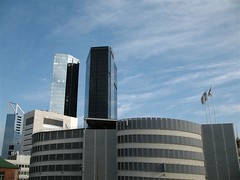 Cute, no? (Click image for full gallery.)
Cute, no? (Click image for full gallery.)That, my dear readers, is one Anna-Maria Galojan, the Reform party's project to create a positive role model of a Russian politician. Blonde, sexy and confident, her election posters in Tallinn were a welcome change from the faces of Klenski, Savisaar and a bunch of other ugly old men. She had no accomplishments at all prior to becoming a billboard babe, but then that's hardly ever stopped anyone.
In the months since the election, Anna-Maria (having failed to get into Parliament) has found herself in control of the Estonian European Movement. She's in the news today for being promptly ejected from that particular easy chair, due to having embezzled around 600,000 EEK (just under 40,000 Euro) of the foundation's money. Apparently spending it on clothes, jewelry, and a flash lifestyle.
In my flame wars, I often get asked why there are no Russians in prominent political positions in Estonia. My standard reply is that there are no people to fill the positions; nobody the people would like and trust. Miss Galojan here was the party-in-power's attempt to create such a figure from scratch, and yet having just done a round of profiles and interviews in the local Russian papers on being a person of principle, she goes and does (or, well, gets caught doing) something like this. With all the good will in the world, where the hell are we supposed to get enough decent Russians to put into government?
Which is not to say that Estonian politicians don't embezzle. But this is Estonia, and any Russian that wishes to be a credible politician with a mainstream party is held to a higher standard. It's not even an issue of distrust on the part of the Estonians. The local Russian-speakers are quite disenfranchised, but the slice of the electorate which is up for grabs is intelligent enough to be disgusted by Savisaar and Zarenkov. Whereas Estonians will tolerate a bit of modest nepotism and self-serving from their politicians as long as the rest of the country is in good shape - on the principle that if they were in power themselves, they'd surely do the same - the unclaimed Russians are far more careful with their trust. They feel betrayed and unrepresented, and suspicious of any advances by Reform or IRL to begin with. It's commendable that the coalition is trying to bring these guys back into the fold, involve them in the political process, but it's not easy winning their trust.
It's not a Russian Kristiina Ojuland that we need, it's a Russian Marek Strandberg.
 The reason the blog has been silent recently was because I've been in a bad mood. I'm just too annoyed by human stupidity. I guess at least partially it's a result of autumn in Estonia - predictably drizzly and depressing. But beyond that, it's been a silly time.
The reason the blog has been silent recently was because I've been in a bad mood. I'm just too annoyed by human stupidity. I guess at least partially it's a result of autumn in Estonia - predictably drizzly and depressing. But beyond that, it's been a silly time.
